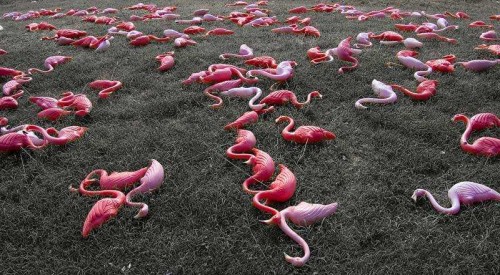Shampoo Horns by Aaron Teel (part one)
Rose Metal Press makes a wonderful chapbook. Shampoo Horns, for example. It feels like hair, if the hair was made of Pop-Tarts or red sun and waterfalls of beer. It was printed on a Vandercook letterpress, with care. It smells like dandelion broth. The entire book-making process is fascinating and you can see it here:
This book has 19 short stories, linked. This would be a good book to examine while considering the nuances/decisions/contemplations of a linked collection. You could ask the author, “What kind of things did you think about when ordering the collection?” You could get Winesburg, Ohio and stack it upright on the dirty kitchen floor and then take three paces and place Shampoo Horns on the disgusting floor (pasta sauce and dream stains, etc.) and then you could fill in the space between the two with other linked books, like stack them into bones or whatnot, and you would have yourself a self-education session. (If you aren’t going to autodidact, you are doomed.)
This book contains red plastic cups, you know the cups, so simple yet they connote so much (even their name–solo). I bet you’ve held a red, plastic cup. Cradled it. Sucked from. There are also “pink flamingos with missing heads” and “stray huskies” and a “overgrown toddler without a shirt” and a “trash bag flapping” and “bologna sandwiches” and “MTV” and “wood panel walls” and a mobile home full of angels and “Texas drawl” and “shit-filled Underoos” and a dildo in a swimming pool and “RV’s” and “a busted La-Z-Boy” and a “greasy ball cap” and a “plastic vodka bottle” and a lot of other THINGS. Agglomeration. Interesting method of delivering the world from a child/boy’s POV. Most don’t do it well. But Teel does, by creating a tornado-like effect of THINGS spinning by, the narrator watching the world blur. Puzzlement and understanding are the milieu of a boy, an aging boy. Your parents are no longer some minor gods. Pain enters life (this world can hurt). And, of course, sex—this strange, persistent force—is in the air. Possibly this is a trailer park Bildungsroman.
The trailer park is a character, but Teel doesn’t take the easy way. There’s no obvious jokes, no lampooning. This is where the character lives, a trailer park by a factory. (His dad calls the factory and its smoke, “The cloud factory.”) It’s omnipresent, the materials, the essence of such a place. It’s necessary to this narrative, but nothing is forced. (I could go into a discussion of K-Mart Realism now, but I’m not going to. You do it.)
Structurally, Teel is once again keen. A tornado is coming (and remember, this is a trailer park). Throughout the collection, the tornado is hinted at, remembered, haunted over, used for tension and for a focal point. It works as metaphor, too. We fear tornadoes for the same reason we fear debilitating illness–a lack of control. A tornado is senseless, careless–it drops in, destroys, lifts away. Certain lives just wait for the day, and they know it’s coming.
The siren, when it starts, scares me more than the weather. I think that it must be Gabriel blowing his horn, and I know that I know that I know I’ll be left behind. Without rinsing or drying off I put on my Underoos and tie a towel around my neck, then run outside. The whole street is standing in the rain, staring at the sky.
Necks go stiff from looking up. Nerves are shot. Beers are opened. Neighbors who never speak stand together in each other’s lots, drinking and praying.
And later:
Trailers are piled atop one another, upside down and inside out, crushed like tin cans, pulled apart like accordions.
Other convergence points are the narrator (Cherry Tree is his name [or Cherry, or CT]), also a nipple is cut off (!), and then–as I’ve noted–the trailer park itself focuses the events.
Teel has many strengths, but mostly I respect his economy. Scenes are crisply rendered, the fat is cut away, the images are centered, and Teel shows an excellent instinct for clarity. (See the tornado aftermath description above.) And here is an introduction to Tater Tot’s (one of Cherry’s friends) Mom:
Something was on the floor in front of the stereo, and I moved closer, fearing it was him, but it was his mother laid out amid a pile of Elvis and Beach Boys records. It was Hell-hot and the air was thick with smoke. Cigarettes were piled in ashtrays and stuffed into empty cans. Tater’s mother lay noiselessly breathing at the foot of the record player, clutching a plastic vodka bottle to her chest. I pried it from her fingers and sniffed it. It smelled of hospital corridors and clean, sharp knives.
There are 19 stories here (this is Rose Metal’s largest chapbook) and with Teel’s technique of imagery compression, we get a lot. You are visiting childhood, but also a demographic (beheaded yard flamingos, people in bathrobes all day, etc), and a unique character with lively voice and acute perception. It’s this merging that makes literature. This is what good writing can do, in whatever genre or length—deliver lives to our life, deliver weight. Flash fiction can stand alone, but I really enjoy reading linked flashes, weight leading onto weight, again, the accumulation. Teel stacks words, images, events together, and, in the end, we get to visit a singular world.
Tags: Aaron Teel, K-mart, rose metal press


I really enjoyed this chapbook. The sense of place was so rich and I felt totally immersed.